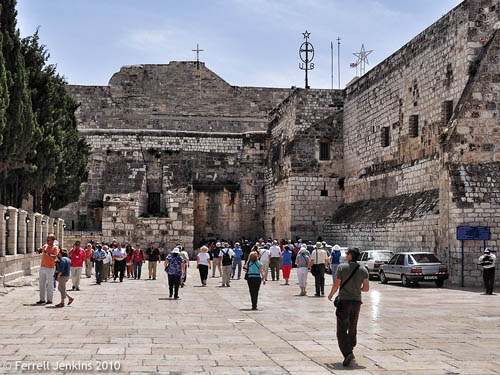Bethlehem — home of David and Jesus
A little more than two years ago we wrote about Bethlehem as the birthplace of Jesus here. We will follow the example of Paul, Peter and Jude to remind our readers of some things we already know (Romans 15;15; 1 Corinthians 4:17; 2 Timothy 2:14; 2 Peter 1:12; Jude 1:5; et al.).
- During the Patriarchal period the town we know as Bethlehem was called Ephrath (Genesis 48:7; 35:9-27).
- Later, as part of the territory allotted to the tribe of Judah, it was the home of Ruth and Boaz and became the birthplace and early home of David (1 Samuel 17:12, 15).
- The town was sometimes called the “city of David” (Luke 2:4, 11), but is most famous as the birthplace of Jesus (Micah 5:2; Luke 2:4-15; Matthew 2:1-16).
When one visits the Bible lands today he must realize that 2,000 years of history, involving both repeated building and the destruction of what has been built, has left nothing to remind one of the original place where Jesus was born. Justin Martyr (ca. A.D. 160) said Joseph “took up his quarters in a certain cave near the village.” Origen (mid-third century) said the cave where Jesus was born was being shown and even the enemies of the faith were talking of it. Jerome, a resident of Bethlehem (A.D. 386-420), tells how the birthplace of Jesus and other places associated with the ministry of Jesus were defiled from the time of Hadrian to the reign of Constantine. The Church of the Nativity now stands at this spot.
This photo shows the exterior of the Church of the Nativity.
My wife saved a portion of our local paper for me last Sunday. The headline says, “Peace swells Bethlehem tourism.” All of the town’s hotel rooms are booked solid for Christmas. Last year 70,000 visited Bethlehem for Christmas, but the number is expected to be “up strongly” this year.
If you have more interest in learning about the origin of the celebration of Christ, take a look here. A more detailed study of the historical aspects of the celebration is available in PDF here.


Thank you for your great blog!
In your blog today you mentioned “If you have more interest in learning about the origin of the celebration of Christ, take a look here.” I looked there and found your article “What About Christmas” where you said you don’t know of anyone claiming Christ was born on Dec 25 before Chysostom. Both Jack Finegan (Handbook of Biblical Chronology, p. 325) and Harold Hoehner (Chronological Aspects of the Life of Christ, p. 25) say that Hippolytus of Rome (AD 170-240) held that Christ was born on December 25th.
In your article “What About Christmas” you argue that December 25th was chosen because of the pagan holiday associated with that date. You might consider some of the arguments against this widely held view that are given by Andrew McGowan in his article “How December 25th Became Christmas” (Bible Review, December 2002). He gives three arguments why the date of Christmas was not chosen based on pagan festivals and then proposes why it was. McGowan says that the “first mention of a date for Christmas (c. 200) and the earliest celebrations that we know about (c. 250-300) come in a period when Christians were not borrowing heavily from pagan traditions.” You may find his article convincing. I think it is worth a read.
Thanks for your note of appreciation for the blog, and the well-worded thoughts on the origin of the Christmas celebration. The article you read is a brief summary written for a small publication a few years ago. More details are available in the paper on “The Truth About Christmas.” I think the historical setting and documentation is set forth there.
I have the sources you mentioned. The note about Hippolytus (AD 170-240) is especially appreciated. Even if this were a universal belief at the time it is about 200 years after the time of Christ and his apostles.
My main point has nothing to do with the birth of Christ and our worship of Him as Lord and King. It has to do with limiting this celebration to a single day each year.
At some later point I will spend more time with McGowan’s argument about pagan borrowing. My understanding of the historical setting is that the church became more and more like the society around them — a danger God’s people have always faced.